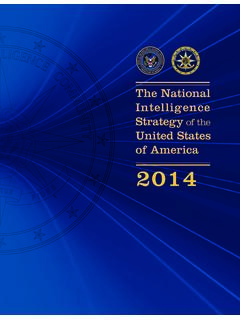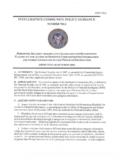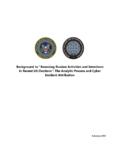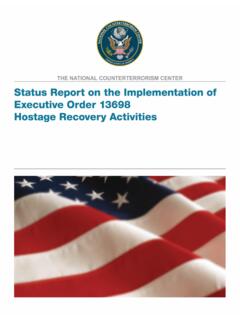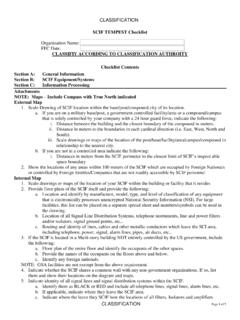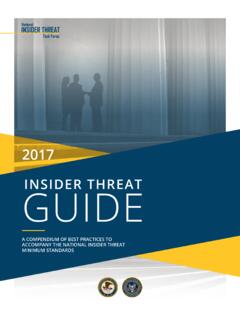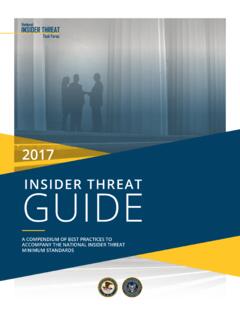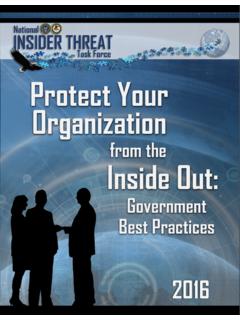Transcription of UNCLASSIFIED DIRECTOR OF NATIONAL INTELLIGENCE
1 UNCLASSIFIED DIRECTOR OF NATIONAL INTELLIGENCE WASHINGTON, DC ES 2021-01529 MEMORANDUM FOR DISTRIBUTION SUBJECT: REFERENCES: Security Executive Agent Clarifying Guidance Concerning Marijuana for Agencies Conducting Adjudications of Persons Proposed for Eligibility for Access to Classified Information or Eligibility to Hold a Sensitive Position A. INTELLIGENCE Reform and Terrorism Prevention Act, as Amended, 50 3343 B. Security Executive Agent Directive (SEAD) 4, NATIONAL Security Adjudicative Guidelines, 08 June 2017 C. Comprehensive Drug Abuse Prevention and Control Act of 1970, 21 801 et seq. D. Executive Order 12564, Drug-Free Federal Workplace, 15 September 1986 E. Drug-Free Workplace Act of 1988, 41 Ch. 81 F. Memorandum to Federal Agency Drug Program Coordinators, Marijuana, Marijuana Oils, Marijuana Infused Products and Hemp Products, Department of Health and Human Services, Substance Abuse and Mental Health Services Administration, 24 July 2019 G.
2 Security Executive Agent Memorandum ES 2014-00674, Adherence to Federal Laws Prohibiting Marijuana Use, 25 October 2014 H. The NATIONAL Security Act of 194 7, as amended Pursuant to 50 3162a, as the Security Executive Agent (SecEA) for the United States Government (USG), I am responsible for issuing guidelines and instructions to the heads of federal agencies to ensure appropriate uniformity in process relating to determinations of eligibility for access to classified information or eligibility to hold a sensitive position, including such matters as investigations, polygraphs, adjudications, and reciprocity. As such, the purpose of this memorandum is to provide clarifying guidance to authorized adjudicative agencies relating to an individual' s involvement with marijuana, particularly in response to the increase in the number of state and local governments legalizing or decriminalizing uses of marijuana.
3 UNCLASSIFIED UNCLASSIFIED SUBJECT: . Security Executive Agent Clarifying Guidance Concerning Marijuana for Individuals Eligible to Access Classified Information or Eligible to Hold a Sensitive Position I encourage agencies to remind civilian, military, and contractor personnel, who are eligible for access to classified information or eligible to hold a sensitive position ( , the NATIONAL security workforce) as well as authorized investigative and adjudicative personnel, of the importance of continued adherence to federal laws and policies, to include adhering to applicable reporting requirements. Of particular note, under policy set forth in SEAD 4' s adjudicative guidelines, the illegal use or misuse of controlled substances can raise security concerns about an individual's reliability and trustworthiness to access classified information or to hold a sensitive position, as well as their ability or willingness to comply with laws, rules, and regulations (Reference B, Guideline H).
4 Drug involvement may raise similar concerns about personal and criminal conduct (Reference B, Guidelines E, J). Thus, consistent with these references, SecEA guidance (Reference G) indicates that disregard of federal law pertaining Jo marijuana remains relevant, but not determinative, to adjudications of eligibility for access to classified information or eligibility to hold a sensitive position. Should there be a change to federal law concerning marijuana use, the SecEA may reexamine SEAD 4 and determine whether updated guidance is appropriate. Based on current federal law, I provide additional adjudicative guidance herein on three topics that have generated ongoing inquiries from federal agencies: 1) recency of recreational marijuana use; 2) use of cannabidiol (CBD) products such as CBD oils; and 3) investment by persons in marijuana-related businesses.
5 With regard to the first topic, agencies are instructed that prior recreational marijuana use by an individual may be relevant to adjudications but not determinative. The SecEA has provided direction in SEAD 4 to agencies that requires them to use a "whole-person concept." This requires adjudicators to carefully weigh a number of variables in an individual's life to determine whether that individual's behavior raises a security concern, if at all, and whether that concern has been mitigated such that the individual may now receive a favorable adjudicative determination. Relevant mitigations include, but are not limited to, frequency of use and . whether the individual can demonstrate that future use is unlikely to recur, including by signing an attestation or other such appropriate mitigation. Additionally, in light of the long-standing federal law and policy prohibiting illegal drug use while occupying a sensitive position or holding a security clearance, agencies are encouraged to advise prospective NATIONAL security workforce employees that they should refrain from any future marijuana use upon initiation of the NATIONAL security vetting process, which commences once the individual signs the certification contained in the Standard Form 86 (SF-86), Questionnaire for NATIONAL Security Positions.
6 With respect to the use of CBD products, agencies should be aware that using these cannabis derivatives may be relevant to adjudications in accordance with SEAD 4. Although the passage of the Agricultural Improvement Act of2018 excluded hemp from the definition of marijuana within the Controlled Substances Act, products containing greater than a percent 2 UNCLASSIFIED UNCLASSIFIED SUBJECT: Security Executive Agent Clarifying Guidance Concerning Marijuana for Individuals Eligible to Access Classified Information or Eligible to Hold a Sensitive Position concentration of delta-9 tetrahydrocannabinol (THC), a psychoactive ingredient in marijuana, do not meet the definition of "hemp." Accordingly, products labeled as hemp-derived that contain greater than percent THC continue to meet the legal definition of marijuana, and therefore remain illegal to use under federal law and policy.
7 Additionally, agencies should be aware that the Federal Drug Administration does not certify levels of THC in CBD products, so the percentage of THC cannot be guaranteed, thus posing a concern pertaining to the use of a CBD product under federal law. Studies have shown that some CBD products exceed the percent THC threshold for hemp, notwithstanding advertising labels (Reference F). Therefore, there is a risk that using these products may nonetheless cause sufficiently high levels of THC to result in a positive marijuana test under agency-administered employment or random drug testing programs. Should an individual test positive, they will be subject to an investigation under specific guidelines established by their home agency. Finally, with regard to the topic of investments, agencies should note that an adjudicative determination for an individual's eligibility for access to classified information or eligibility to hold a sensitive position may be impacted negatively should that individual knowingly and directly invest in stocks or business ventures that specifically pertain to marijuana growers and retailers while the cultivation and distribution of marijuana remains illegal under the Controlled Substances Act.
8 Under SEAD 4' s guidance for personal conduct (Reference B, Guideline E), a decision to invest in an activity, including a marijuana-related business, which the individual knows violates federal law could reflect questionable judgment and an unwillingness to comply with laws, rules, and regulations. That is, it is appropriate for adjudicative personnel to consider whether an individual is knowingly facilitating violations of the Controlled Substances Act by engaging in such investments. On the other hand, if the marijuana-related investment is not direct, such as an investment in a diversified mutual fund that is publicly-traded on a United States exchange, adjudicators should presume that individual did not knowingly invest in a marijuana-related business~ thus, the indirect investment should not be considered relevant to adjudications.
9 In some instances, the investment itself may be illegal, which is also relevant to SEAD 4' s guidance for criminal conduct (Reference. B, Guideline J), which by its very nature calls into question an individual's ability or willingness to comply with laws, rules, and regulations. However, under the whole-person concept, any mitigating factors should be considered. For example, if an individual holds direct stock investments pertaining to marijuana growers and retailers, divestment of such activity or disassociation of such activity should be considered a mitigating factor when rendering an adjudicative decision. Heads of agencies are expected to advise their prospective and current workforce to adhere to federal laws prohibiting marijuana use. 3 UNCLASSIFIED UNCLASSIFIED SUBJECT: Security Executive Agent Clarifying Guidance Concerning Marijuana for Individuals Eligible to Access Classified Information or Eligible to Hold a Sensitive Position Should you have any questions concerning this guidance, please contact my staff at Avril D.
10 Haines Date 4 UNCLASSIFIED UNCLASSIFIED SUBJECT: Security Executive Agent Clarifying Guidance Concerning Marijuana for Individuals Eligible to Access Classified Information or Eligible to Hold a Sensitive Position Distribution: Secretary, Department of State Secretary, Department of the Treasury Secretary, Department of Defense Attorney General, Department of Justice Secretary, Department of the Interior Secretary, Department of Agriculture Secretary, Department of Commerce Secretary, Department of Labor Secretary, Department of Health and Human Services Secretary, Department of Housing and Urban Development Secretary, Department of Transportation Secretary, Department of Energy Secretary, Department of Education Secretary, Department of Veterans Affairs Secretary, Department of Homeland Security Administrator, Environmental Protection Agency DIRECTOR , Office of Management and Budget United States Trade Representative Administrator, Small Business Administration DIRECTOR , Central INTELLIGENCE Agency DIRECTOR .
